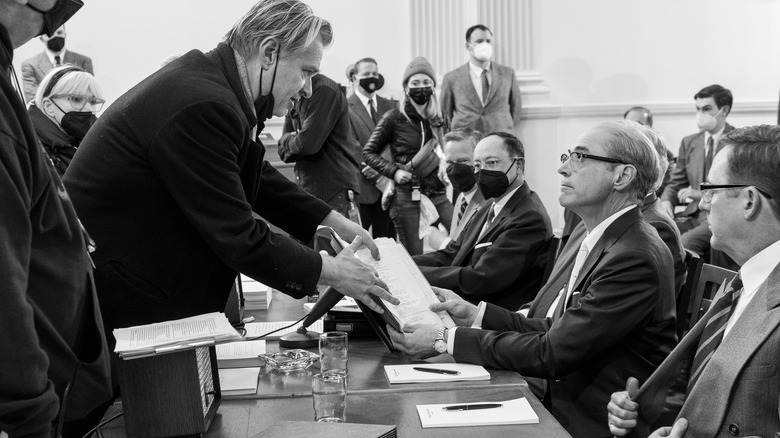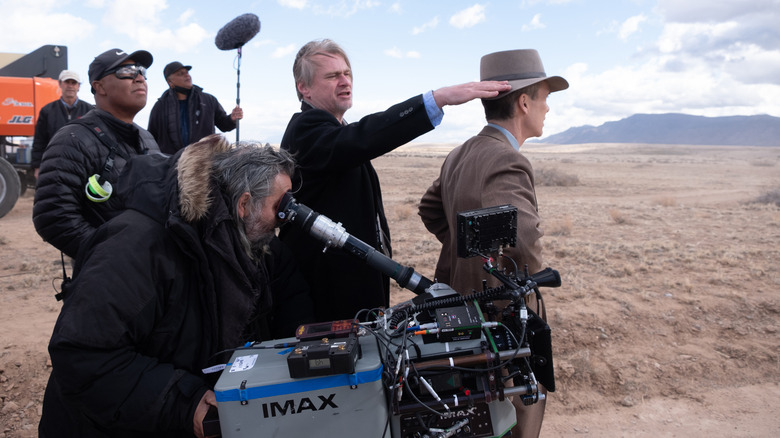Oppenheimer Has Opened The Door To A 'Post-Franchise' World, Says Christopher Nolan
It might not have seemed like it at the time, but there was a lot riding on the success — or failure — of "Oppenheimer." A three-hour biopic that covers incredibly dark and sobering material, much of it filmed in black and white and practically all of it unfolding through a series of conversations in various indoor sets, simply couldn't be expected to perform as well these days as movies like it have done in decades past ... right? Incredibly enough, audiences turned out for it in droves and helped bring the World War II drama within spitting distance of a billion dollars at the box office, not to mention the Academy rewarding the success story with a whopping 13 Oscar nominations. Everything's coming up Christopher Nolan, you could say, but the acclaimed director has drawn even grander conclusions based on the response to his latest hit.
While making an appearance on the "Countdown to the BAFTAs" podcast, Nolan was asked about his thoughts on what the over-performance of "Oppenheimer" indicates about the health of the film industry and the tastes of the general moviegoing public — a broad question, admittedly, but one that the filmmaker didn't shy away from answering. As he articulated it:
"We just released a three-hour R-rated film about quantum physics and it made a billion dollars. Like, what? Obviously, our view is that the audience is there and they're excited to see something new."
"I think the success of 'Oppenheimer' certainly points to a sort of post-franchise, post-IP landscape for movies — it's kind of encouraging. It reminds the studios that there is an appetite for something people haven't seen before or an approach to things that people haven't seen before."
Eyes on the prize
Is that pure ego talking, or is Christopher Nolan actually onto something here? On the surface, it's easy to point out the obvious: "Oppenheimer" didn't do it entirely on its own. It owes at least some amount of credit to audiences flocking to see "Barbie" in theaters, who then turned around and made the opening weekend into a double feature with Nolan's latest. Similarly, it'd be silly to ignore the fact that many ticket buyers were influenced by marketing that heralded, among other things, "From the director of 'The Dark Knight' trilogy." That, as we all know, was the epitome of an IP-based franchise. Barbie and Batman teaming up to give "Oppenheimer" a boost doesn't quite line up with Nolan's idealistic narrative, does it?
Well, maybe it does! On the same podcast appearance, Nolan went on to say that, "Something like 'Oppenheimer' working, it gives other filmmakers a point of reference for how something can work in the marketplace that the studio can relate to." In other words, maybe this is just the start of Nolan's hopes for studios relying less on pre-existing IPs and more on the kinds of stories that filmmakers naturally want to tell. Then again, maybe Nolan leveling up the superhero boom with "The Dark Knight" back in 2008 is exactly why we're in this mess to begin with ... and now it's far too late to put the genie back in the bottle. That interpretation certainly lines up with those who watched "Oppenheimer" and came away with the idea that Nolan saw himself as the brilliant scientist J. Robert Oppenheimer — someone who had the best of intentions, but ended up creating an all-consuming monster.
As is typically the case with these conversations, the truth likely lies somewhere in the middle.

